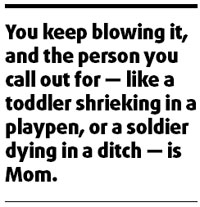Ma, Ma, open the door, he cried out fitfully
By Caitlin Flanagan (China Daily)
Updated: 2008-05-13 08:01
Updated: 2008-05-13 08:01
Not long ago, I was riding my bike through a quiet stretch of Van Nuys with my friend Francie, her dog Pearl, and my 10-year-old son, Conor. One of them spied a cell phone in the middle of the street, so we doubled back and Francie picked it up.
"What should we do?" she said.
"Call Mom," I said. "Turn it on, scroll through the names, and when you get to 'Mom', hit 'send'."
Then Francie looked back at the phone and did what I said.
"There it is!" she said. "Mom!"
She and Conor looked at me in this sensationally respectful way, the same way I had looked at the friend of mine who had picked up a stray cell phone on Venice Beach last year and said, "I'll call Mom."
Not everyone who has a cell phone has a mother, but among the subpopulation of cell phone owners who are careless with them, the number is apparently high.
Mom wasn't home, but someone named Hugo was, and he called us right back. Francie told him the name of the nearest intersection, and that she would hide the cell phone under the porch of a particular house.

Calling Mom when you find a lost cell phone is satisfying for a number of reasons. In the first place, of all the people on that address list, she is the only one who is both fully accustomed to cleaning up the owner's messes and also completely willing to wipe up the next one. It's as though from that first meconium diaper she's stuck with your stinkies and foul-ups until she draws her last breath.
It's also satisfying because the cell phone shedder has inconvenienced you, however mildly; the social contract requires that you find a way to return the thing, but along the way your lovely bike ride is interrupted. Because it has an address list, the cell phone gives you one of the few opportunities that you can, in effect, say to another adult: "You've messed up, and I'm going to call your mother!"
You spend your entire adolescence and much of your adulthood trying to shake her, trying to be a grown-up, a smooth operator, but you keep blowing it, and the person you call out for - like a toddler shrieking in a playpen, or a soldier dying in a ditch - is Mom. She co-signs your car notes and wires you cash, she takes in the dog you should never have adopted, pays for your wedding and then keeps up your spirits during the divorce.
Your vision of your adult life with your mother is one of spoiling her, of being so successful in your endeavors that you are able to cradle her in comfort and luxury, and that your visits will be demonstrations of largess and tenderness, the car trunk opening to reveal some expensive new kitchen appliance or extravagant winter coat.
Instead, you get some frightening news from a doctor, and the first person you call - because making her weep with fear and grief seems like the one thing that might cheer you up - is Mom.
Mother's Day, of course, is not an occasion on which we are invited to examine the whole equation that is - or was - Mom. It is time for putting her through her paces, sloshing bowls of Special K onto her comforter at the crack of dawn, or slapping an orchid on her lapel and propping her up at the Hilton for brunch.
It is an exercise in manufactured emotion whose roots lie in maternal suffering: Woodrow Wilson declared the first official American Mother's Day as a tribute to the mothers who had lost sons in the war. Its fortunes are now so intimately involved with those of the National Restaurant Association (it's the biggest dining-out day of the year) that we can hardly expect anyone to jeopardize 5 million mimosas in favor of a more honest consideration of the ways in which the most intimate relationship of our lives has formed and sustained us.
We felt that Goodnight Moon had been written with us in mind. It's been long enough now that I cannot always remember the way her voice sounded, but I can hear it as clearly as if she were here beside me if I say the old incantation to myself: "Goodnight room. Goodnight moon. Goodnight cow jumping over the moon."
Goodnight Moon is a poem about going to sleep, and like all such poems, I realize now, it is also a poem about death. As a little girl, I used to think of the "old lady whispering hush" as my own mother. And now - at 46 - I still do. I once read a newspaper account of an elderly man who lay dying in a nursing home bed; a few hours before he passed, he cried out fitfully, "Ma, Ma, open the door!"
Maybe that's how it ends - maybe it's just Mom, opening up the door because we've lost our keys again.
Until then, if you happened to have come across a red-and-black flip phone lost three months ago in the mid-Wilshire section of Los Angeles, would you send it to me, care of this newspaper?
The author is a writer The New York Times Syndicate
(China Daily 05/13/2008 page9)
|
|
|
|